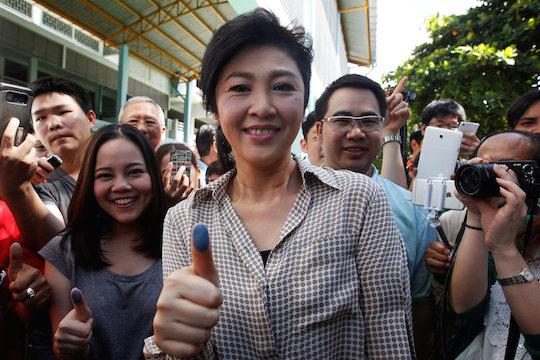ASIACALLING
Thailand votes in favor of new, military backed constitution
"Despite international concerns over a crackdown on democratic freedoms, Thailand has voted an overwhelming yes to a new military backed constitution."
Kannikar Petchkaew

Despite international concerns over a crackdown on democratic freedoms, Thailand has voted an overwhelming yes to a new military backed constitution.
Almost 60 percent of voters that turned out for the referendum last Sunday support the new charter – Thailand’s 20th constitution since 1932.
But critics say the new constitution only extends more power to the military led government
Asia Calling’s Kannikar Petchkaew has the story from Chiang Mai.
It used to be very crowed here in Borsang, a handicraft village in northern Thailand that’s famous for its paper umbrellas.
Now the major tourist attractions are empty. The coup appears to have had a quieting effect.
On-gaj is a vendor in his 50s. He started his business a decade ago, hoping he could start a better life for his family.
But these days he tells me, especially after the political coup two years ago, he hardly makes a penny.
Viputalaeng is in his 60s now. I met him here in Chiang Mai, when he paid a visit to the family of a local politician detained for violating the referendum act.
A former MP who lost his job when the military took over in the coup in 2014, Viputalaeng knows politics when he sees it.
And the junta played years of civil unrest to its advantage, he argues.
“People were just sick of the unrest, the street demonstrations, the chaos. They didn’t see that all those incidents were a conspiracy planned to legitimize the coup and undemocratic rule,” Viputalaeng told me.
Like many other politicians Viputalaeng was detained right after the coup and now lives under surveillance. He’s also barred from all political activities.
After taking power in 2014, Thailand’s interim, military-backed National Council for Peace and Order (NCPO), led by General Prayuth Chan-ocha, has stifled the media and banned political gatherings.
Ahead of the referendum vote, political rallies and open discussion about the new constitution were banned, and criticism of the draft was made punishable by 10 years in jail.
Vendor Ong-Aj, says the environment was tightly controlled.
“In the last referendum in 2007 we were allowed to study all the content and participate with our ideas. But this one is just a sheet full of manipulation,” Ong-Aj said.
The military backed government has said the new constitution is a major step toward a fully functioning democracy – and healing more than a decade of divisive politics and civil unrest.
Yet the new constitution also designates seats for the military in the parliament, a move rights groups say will give the military more power now, as well as guarantee its influence in Thai politics well into the future.
Even still, junta head General Prayuth has promised general elections will go ahead next year.
“The New Constitution is a sign of the new election coming next year. In the meantime the government and you the people still have a mutual obligation to the country’s security and development. A big obligation awaits, it’s the hope and the survival of this country. It is the country’s reform,” declared General Prayuth.
Even though the turnout was lower than expected, almost 60 percent of voters chose the new constitution.
But here in Thailand, some people felt that voting ‘no’ wasn’t really an option.
Long time social critic, Pipop Udomittipong explains.
“The dangerous thing is they started to trample down people who cast a “no” vote. That’s pretty dangerous because as you can see the majority of the people in the north and the northeast, they feel they have been suppressed. They feel frustrated under the military rule. That’s very clear,” Udomittipong stated.
Thailand’s north has historically been a stronghold of the red shirt camp, supporters of former prime minister Yingluck Shinawatra, who was ousted by the junta two years ago.
The other camp known as the yellow shirts are more closely aligned to the military and urban elites in the capital.
Despite the government’s claims, Udomittipong says the referendum will only fuel more frustration and division, especially among many in the north who didn’t support the junta to start off with.
“The thing is, can we say that these grudges, all this frustration, all this sense of depression. Are the gone? No they are not. They are still there. They are simply made latent by the strong grip of power, by the strong depression,” Udomittipong emphasises.
And what’s the long term effect of that?
Here’s Udomittipong’s take.
“It will explode. That wouldn’t be nice. We have seen it in 2010. We have seen it in 1992 or even longer. It turned out very ugly and that shouldn’t happen again. We shouldn’t repeat the same mistake.”
- Thailand Constitution
- Thailand vote
- Pipop Udomittipong
- Kannikar Petchkaew
- General Prayuth Chan-ocha
Komentar
KBR percaya pembaca situs ini adalah orang-orang yang cerdas dan terpelajar. Karena itu mari kita gunakan kata-kata yang santun di dalam kolom komentar ini. Kalimat yang sopan, menjauhi prasangka SARA (suku, agama, ras dan antargolongan), pasti akan lebih didengar. Yuk, kita praktikkan!